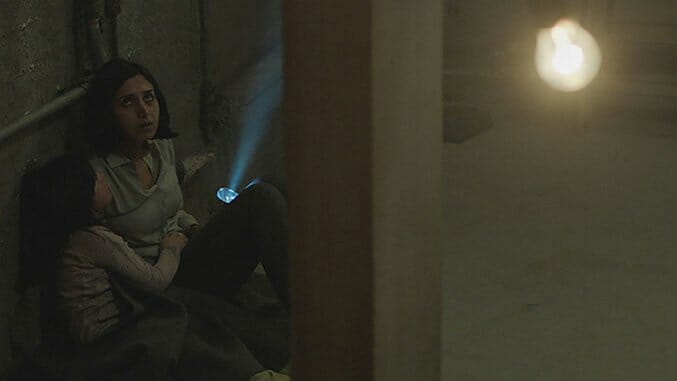Introducing Endless Mode: A New Games & Anime Site from Paste
For its first 30 minutes, you won’t even know it’s a horror movie. Set in 1980s Tehran (though made in Jordan with British money) at the height of the Iran-Iraq War, Under the Shadow initially unfolds like an austere war-time drama, its naturalistic performances and docu-visuals suggesting social realism, not a ghost story. The title, suggestively ominous, could refer to life lived under the shadow of both foreign missiles and domestic oppression in Khomeini’s Iran. Or it could refer to the film’s leading woman, a young mother stupefied into depression by a perfect storm of external factors.
Politically active for the losing side during the Cultural Revolution, Shideh (Narges Rashidi) is now barred from completing her studies and realizing her dream of becoming a doctor. Iran’s new conservative regime has little affection for a woman like her, at one point threatened with lashes for stepping outdoors without a veil. Her doctor husband has been sent away on a dangerous government assignment, leaving Shideh to care for their daughter, Dorsa (Avin Manshadi), alone in their apartment. And, capping it all, the war continues to rage outside. As enemy bombs rain down and their friends flee Tehran amid rumors that attacks on the city are about to intensify, Shideh and Dorsa increasingly find less reason to venture outside the home.
Only as Under the Shadow morphs into a single-location movie do we begin to notice what kind of film this really is. For much of the second half, director Babak Anvari doesn’t allow us to escape his haunted house. Shideh and Dorsa are trapped there by circumstance, forced to possibly cohabit with a djinn, a mischievous spirit of Arabian folklore that apparently wants to snatch Dorsa, and which Shideh first begins to sense after a missile crashes into the apartment above. The djinn could be very real, brought to the block by the warhead or by a mute new child resident whose parents were killed by Iraqi fire. Or, it could be entirely imaginary, a product of Shideh’s exhausted and paranoid mind.
The appeal of Under the Shadow is not in ascertaining what the djinn really is or what it might want, but what its “presence” reveals about the film’s lead, wracked by doubt in her abilities as a mother and inherently distrustful of her own environment—not to mention what it reveals about writer-director Anvari, whose life during this time wasn’t hugely dissimilar from Dorsa’s (he, like Dorsa, was largely raised by his mother in Tehran during the Iran-Iraq conflict, his doctor father sent by the government to the frontline). His is a film about the supernatural, but it’s also by his own admission autobiographical. It’s a primal scream of a movie, with the djinn possibly the unease Anvari felt as a child made physical, a manifestation of his former country’s anxiety at a time of unremitting strife.
Under the Shadow features two major breakouts: Narges Rashidi, the Iranian-German actress who gives a dishearteningly convincing portrait of depression by playing Shideh as constantly sapped, and Anvari, who with his debut proves himself as adept at politically-charged social-realism as he is at horror. The scares are implemented sparingly and precisely, Anvari shocking with a hand crashing through a window, or getting at some place deeper with the djinn itself, a whirling, faceless terror in a monochrome-patterned chador.
For most of the film, however, Anvari is making a stifling period drama, a horror movie of a different sort that tangibly conveys the claustrophobia of Iran during its tumultuous post-revolution period. Anvari, himself of a family that eventually fled the Ayatollah’s rule, has made Under the Shadow as statement of rebellion and tribute to his own mother. It’s a distinctly feminist film: Shideh is cast as the tough heroine fighting back against greater hostile forces—a horror movie archetype that takes on even more potency in this setting. Seeing Shideh defy the Khomeini regime by watching a Jane Fonda workout video, banned by the state, is almost as stirring as seeing her overcome her personal demons by protecting her child from a more literal one.
Director: Babak Anvari
Writer: Babak Anvari
Starring: Narges Rashidi, Avin Manshadi
Release Date: October 7, 2016
